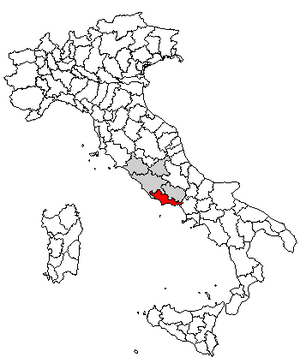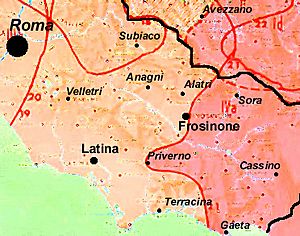Province of Latina facts for kids
Quick facts for kids
Province of Latina
Latina
|
|
|---|---|
 |
|
| Country | |
| Region | Lazio |
| Capital | Latina |
| Area | |
| • Total | 2,251 km2 (869 sq mi) |
| Population
(2005)
|
|
| • Total | 519,850 |
| • Density | 231/km2 (600/sq mi) |
| Postal Code |
04100
|
| Telephone prefix |
0773, 06, 0771
|
| ISTAT | 059 |
| Vehicle registration | LT |
| No. of communes | 33 |
The Province of Latina (Italian: Provincia di Latina) is a special area of local government in Italy. It is one of five provinces that make up the Lazio region. The main city and capital of the province is Latina. This province shares borders with Frosinone to the northeast and the Metropolitan City of Rome Capital to the northwest.
The Province of Latina covers about 2,251 square kilometers (870 square miles). In 2012, it had a population of 561,189 people. There are 33 comuni (which are like towns or municipalities) in the province.
Contents
Main Towns in Latina Province
Here are some of the towns with the largest populations in the Province of Latina:
| Comune | Population |
|---|---|
| Latina | 112,533 |
| Aprilia | 63,265 |
| Terracina | 44,480 |
| Formia | 36,822 |
| Fondi | 35,115 |
| Cisterna di Latina | 33,108 |
| Sezze | 22,859 |
| Gaeta | 21,541 |
| Minturno | 18,366 |
| Sabaudia | 17,581 |
| Priverno | 13,728 |
| Pontinia | 13,517 |
| Cori | 10,808 |
| Itri | 10,404 |
| San Felice Circeo | 8,212 |
| Sermoneta | 7,083 |
| Sonnino | 7,056 |
| Santi Cosma e Damiano | 6,678 |
| Monte San Biagio | 6,106 |
History of the Province
The Province of Latina was created on December 18, 1934. It mainly included areas that were once part of the province of Rome. These areas, like the Agro Pontino, used to be marshlands. They were drained and made suitable for living and farming.
Besides the Pontine lands, the province also includes mountain ranges. These are the Aurunci, Lepini, and Ausoni mountains. The Pontine Islands archipelago is also part of this province. The towns of Gaeta and Formia, located in the southernmost part, traditionally belonged to the Campania region.
Geography and Landscapes
Even though it's the smallest province in the Lazio region, Latina has many different types of landscapes and historical areas.
Hills and Mountains
In the southern and northeastern parts of the mainland, you'll find mostly hills and mountains made of limestone. These ranges include the Lepini, Aurunci, and Ausoni. The highest point is Monte Petrella in the Aurunci mountains, which is 1,533 meters (5,030 feet) tall.
The climate here has hot summers and cold winters. Temperatures rarely drop below 0°C (32°F). These mountains are home to small medieval villages called borghi. People traditionally raised cattle and farmed here. However, these activities have decreased. Today, many people travel daily to work in Rome or Latina.
Tourism is becoming more popular in this area. Visitors are drawn to the untouched nature and historical art from the Middle Ages. Examples include the Abbeys of Valvisciolo and Fossanova, where Saint Thomas Aquinas passed away. The main towns in this mountain area are Cori, Sezze, and Priverno.
The Agro Pontino Plain
The Agro Pontino is a flat area that stretches south from Aprilia to Terracina, along the Tyrrhenian Sea. Before the 1930s, this area was covered by unhealthy marshes. These marshes were drained under the Fascist government. After that, new cities like Sabaudia and Latina itself were built. People from northeastern Italy moved here to settle. The only mountain peak in this plain is the Circeo promontory. The climate here is mild.
The Agro Pontino is the most developed part of the province. It has a strong farming sector and many businesses and industries. It also has many important water areas, like the coastal Lakes of Fogliano, Caprolace, and Paola. Besides the capital city, other important towns here include Cisterna di Latina, Terracina, and Sabaudia.

Formia and Gaeta Areas
Gaeta and Formia are cities with rich ancient and medieval history. They were traditionally part of the Kingdom of Naples. These cities belonged to the Campania region until 1934. You can still see signs of their different culture in their customs. Most notably, their local dialect is a type of Neapolitan.
Formia and Gaeta form a single metropolitan area. They have an important port with connections to the Pontine Islands. There is also a train station on the main railway line between Rome and Naples. Other important towns in this area include Sperlonga and Minturno.
Pontine Islands
The Pontine Islands were once used mainly as prisons. Today, they are a well-known tourist spot, especially in summer. The only islands where people live are Ponza and Ventotene.
See also
 In Spanish: Provincia de Latina para niños
In Spanish: Provincia de Latina para niños
 | Audre Lorde |
 | John Berry Meachum |
 | Ferdinand Lee Barnett |

